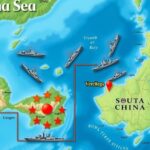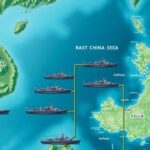Politics
ASIA, ASIA - PACIFIC, AUSTRALIA, CHINA, CUBA, DEFENSE, EASTERN THEATER COMMAND, GEOPOLITICS, JAPAN, KOREA, MEXICO, MINISTRY OF NATIONAL DEFENSE, NEW ZEALAND, NORTH AMERICA, OCEANIA, PEOPLE ’ S LIBERATION ARMY, PHILIPPINES, SCS, SHI YI, SOUTH CHINA SEA, SOUTH CHINA SEA DISPUTE, TAIWAN, TAIWAN STRAIT, TERRITORIAL DISPUTES, UNITED STATES, US, US STATE DEPARTMENT, US-CHINA RELATIONS, WASHINGTON
Omar El-Sharif
US Reiterates Support for Taiwan Amid China’s Military Aggression
The United States has reaffirmed its support for Taiwan, denouncing China’s aggressive military activities as destabilizing and a threat to regional security. Following significant military drills by China aimed at Taiwan, Taiwan’s officials underscore escalating tensions. The Philippines also expresses concern for its citizens in Taiwan amid this turbulent atmosphere.
The United States expressed grave concerns regarding China’s military maneuvers around Taiwan, emphasizing its dedication to maintaining security in the Asia-Pacific region. The US State Department characterized China’s actions as “intimidation tactics and destabilizing behavior,” stating that such activities only heighten tensions and threaten both regional stability and global prosperity.
China recently conducted extensive military drills involving a carrier battle group, aiming to send a stern warning against Taiwanese independence aspirations. These exercises, which comprised naval, air, ground, and rocket forces, were described by the People’s Liberation Army as a “severe warning” against Taiwan’s governance.
Taiwan’s stance is clear; the island operates under a de facto independent status, while China asserts it as part of its territory. Any potential conflict may engage the US, which is legally obligated to view threats to Taiwan as serious concerns. Taiwan’s Presidential Office condemned China’s military provocations, asserting they jeopardize peace in the Taiwan Strait and regional stability.
The current military activities included tracking by Taiwan’s Ministry of National Defense, which reported monitoring 19 Chinese naval vessels. There is a growing concern regarding a possible surprise attack by China. Taiwan’s Defense Minister Wellington Koo articulated that such actions reveal China’s undermining of regional peace.
Taiwan has established a central response team to stay vigilant against these escalating military exercises. The mood in Taipei appears tense, with citizens expressing greater worry over economic conditions and geopolitical developments, particularly those involving the US administration.
In addition to military drills in the vicinity of Taiwan, China has conducted operations in the South China Sea, asserting extensive territorial claims. The PLA’s exercises were publicly detailed, indicating a focus on improving operational capabilities and conducting precision strikes.
Furthermore, China’s Taiwan Affairs Office explicitly targeted Taiwan’s President Lai Ching-te, criticizing his pro-independence stance and describing recent Chinese actions as necessary countermeasures against perceived threats. The heightened tensions between Taiwan and China have roots that extend back 76 years to their civil war.
In the Philippines, military chief Gen. Romeo Brawner Jr. underscored the urgency of preparing for potential evacuations of Filipino citizens residing in Taiwan in the event of a conflict, highlighting the interconnectedness of regional security dynamics.
In conclusion, the tensions between China and Taiwan continue to escalate amid aggressive military posturing from Beijing. The United States remains committed to supporting Taiwan and maintaining regional stability. The implications of these developments are significant, not only for Taiwan and China but also for the broader Asia-Pacific region, as other nations prepare for potential impacts.
Original Source: www.arabnews.com








Post Comment